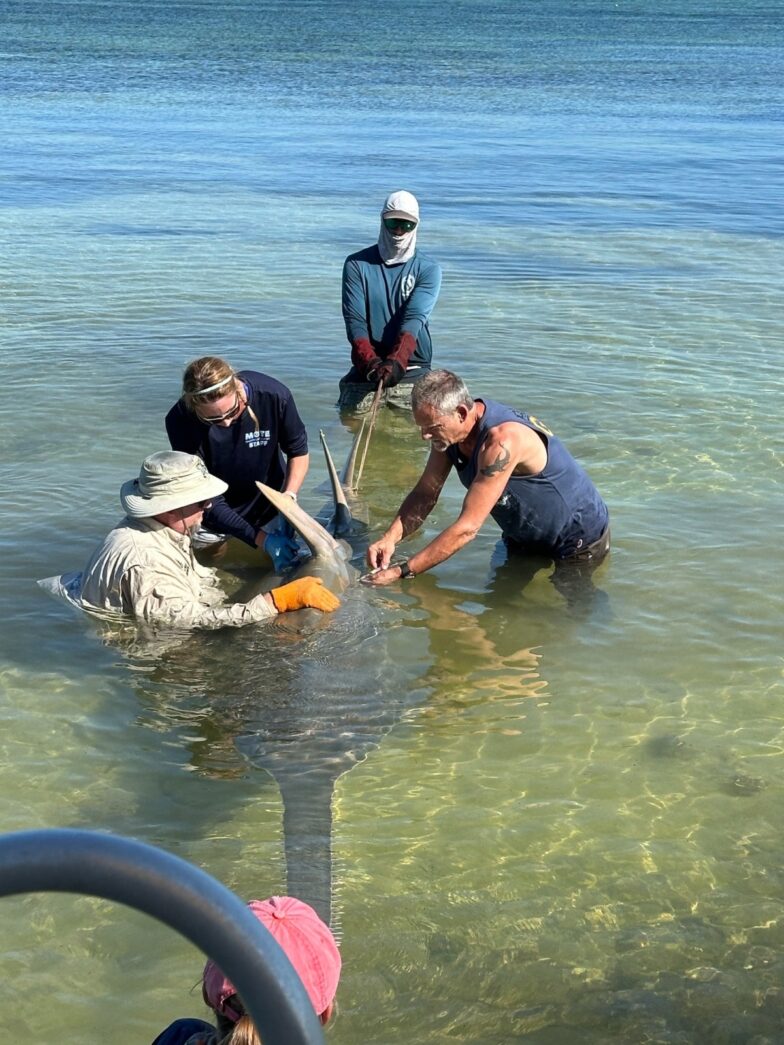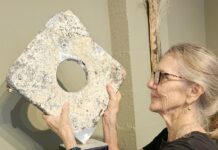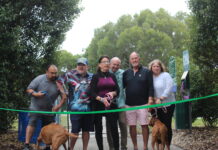On April 5, Mote Marine Laboratory and the Florida Fish and Wildlife Conservation Commission responded to a distressed smalltooth sawfish after a member of the public called the sawfish hotline and reported the animal swimming in circles in Cudjoe Bay in the Lower Keys. During the effort, a joint FWC-Mote team of skilled and trained scientists and veterinary staff completed a quick field assessment that included taking samples, measurements and tagging.
The 11.15-foot male sawfish was loaded onto a vessel and provided respiratory assistance during the short boat ride to a temporary holding tank at a Mote facility in the Lower Keys, where it was under around-the-clock observation by qualified personnel, as requested by and under the guidance of FWC and National Oceanic and Atmospheric Administration (NOAA) Fisheries.
The interim holding tank at Mote’s Lower Keys facility gave the team an area where they could stabilize the animal, though it remained in critical condition. After several days of treatment and monitoring, the team decided that the animal appeared capable of withstanding the seven-hour drive to another Mote quarantine facility designed to provide more extensive rehabilitation treatment for sawfish.
On April 11, biologists carefully loaded the sawfish into a transport trailer operated by Ripley’s Aquariums. Ripley’s Aquariums conservation team monitored the sawfish and water quality conditions throughout the transport to Mote’s facility.

Now at Mote’s more extensive quarantine facility, the sawfish will continue to be monitored 24 hours a day and treated in hopes of fully rehabilitating its health before releasing it.
“The Mote, NOAA, FWC, and Ripley’s staff exhibited tremendous dedication, compassion, partnership, and skill in providing vital care to this animal in need, and are to be commended for their efforts,” said Michael P. Crosby, president & CEO of Mote Marine Laboratory & Aquarium. “Without hesitation or any identified source of funding support, Mote remains committed to providing FWC and NOAA with significant ongoing assistance and support of our expert scientists across diverse disciplines, veterinary and animal husbandry staff, along with our significant specialized marine species quarantine facilities for the rescue and rehabilitation of distressed smalltooth sawfish.”
“Led by NOAA, our biologists and partners have taken an unprecedented step to rescue an adult smalltooth sawfish in the Keys. This has not been attempted before, but this unusual mortality event made this necessary,” said Gil McRae, director of FWC’s Fish and Wildlife Research Institute. “We are hopeful this rescue and rehabilitation of an adult smalltooth sawfish will bring us one step closer to understanding the cause of this event.”
Over the past few months, sightings of “spinning” fish across multiple species have been reported in the Florida Keys. Along with this abnormal behavior, there have also been reports of fish deaths, including 38 smalltooth sawfish to date. There have also been reports of small-scale fish kills.
Scientists do not yet know what is causing the erratic behavior. NOAA Fisheries has initiated an emergency response effort with FWC, Mote Marine Laboratory and other partners including Havenworth Coastal Conservation, Dynasty Marine Associates Inc., and Ripley’s Aquariums, to possibly rescue, rehabilitate and release smalltooth sawfish affected by this event. Investigations into the abnormal behavior and mortalities by FWC are ongoing.
As of April 10, FWC reported 38 sawfish deaths in the Florida Keys. A total of 211 fish samples and 163 water samples were collected.
How can the public assist?Continue reporting all sawfish observations (healthy, sick, injured or dead) to 844-472-9347 or sawfish@myfwc.com. Report abnormal fish behavior and fish kills to the Florida Fish and Wildlife Conservation Commission’s Fish Kill Hotline at 800-636-0511 or MyFWC.com/ReportFishKill. To support the Sawfish Rescue Initiative, visit www.mote.org/sawfish.






















